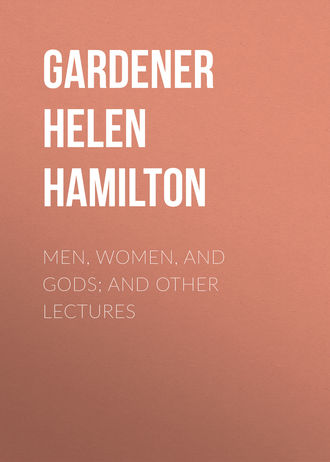 полная версия
полная версияMen, Women, and Gods; and Other Lectures
27
See Appendix F, 2.
28
"To Augustine, whose early life was spent in company with the most degraded of womankind, is Christianity indebted for the full development of the doctrine of Original sin."
– Gage.
"All or at least the greater part of the fathers of the Greek Church before Augustine, denied any real original sin." – Emerson. "The doctrine had a gradual growth, and was fully developed by Augustine."
– Waite.
29
"The abbot elect of St. Augustine, at Canterbury, in 1171, was found on investigation to have seventeen illegitimate children in a single village. An abbot of St. Pelayo in Spain, in 1180, was proved to have kept no less than seventy mistresses. Henry III, Bishop of Liege, was deposed in 1274 for having sixty-five illegitimate children."
– Leeky, "Hist, of European Morals." "This same bishop boasted, at a public banquet, that in twenty-two months fourteen children had been born to him. A license to the clergy to keep concubines was during several centuries levied by princes." – Ibid. "It was openly attested that 100,000 women in England alone were made dissolute by the clergy."
– Draper, "Intellectual Development of Europe."
30
Blackstone. Sharswood.
31
Maine's "Ancient Law," 158.
32
See Lea's "Sacerdotal Celibacy."
33
"It is not impossible but that a more correct understanding of the laws of life and heredity may establish the fact that because of the subjection of woman, the entire race has been mentally dwarfed and physically weakened."
– Gamble.
34
Blackstone. Christian.
35
It still claims exemption from taxation, thus throwing its burden on others; and it also claims immunity from the very gambling laws which it so rigidly enforces against other institutions.
36
See Appendix T.
37
See Appendix G, 1-4.
38
See Appendix U.
39
See Clifford's "Scientific Basis of Morals," p. 25
40
See Morley's "Diderot," p. 190.
41
See Lecky, Milman, Diderot, Morley, Christian, and others.
42
"In the fourth century we find that holy men in council gravely argued the question, and that too with abundant confidence in their ability and power to decide the whole matter: 'Ought women to be called human beings?' A wise and pious father in the Church, after deliberating solemnly and long on the vexed question of women, finally concluded: 'The female sex is not a fault in itself, but a fact in nature for which women themselves are not to blame;' but he graciously cherished the opinion that women will be permitted to rise as men, at the resurrection. A few centuries later the masculine mind underwent great agitation over the question: 'Would it be consistent with the duties and uses of women for them to learn the alphabet?' And in America, after Bridget Gaffort had donated the first plot of ground for a public school, girls were still denied the advantages of such schools. The questions – 'Shall women be allowed to enter colleges?' and 'Shall they be admitted into the professions?' have been as hotly contested as has been the question of their humanity."
– Gamble.
43
"There existed at the same time in this celebrated city a class of women, the glory of whose intellectual brilliancy still survives; and when Alcibiades drew around him the first philosophers and statesmen of Greece, 'it was a virtue to applaud Aspasia;' of whom it has been said that she lectured publicly on rhetoric and philosophy with such ability that Socrates and Alcibiades gathered wisdom from her lips, and so marked was her genius for statesmanship that Pericles afterward married her and allowed her to govern Athens, then at the height of its glory and power. Numerous examples might be cited in which Athenian women rendered material aid to the state."
– Gamble.
44
See Morley's "Diderot," p. 76; Lea's "Sacerdotal Celibacy;" Lecky's "European Morals."
45
See Appendix H, 1 to 4.
46
Lecky, "European Morals," p. 310.
47
One of the simplest and most interesting explanations of this latter point will be found in "The Childhood of Religions," by Edward Clodd, F.R.A.S., where the Christian reader may be surprised to find that the "ten-commandment" idea (with a number of them which apply to general morals, as "Thou shalt not kill," etc.) is not confined to our Bible, but is found also in the Buddhist Bible in the same form; that the "golden rule" was given by Confucius 500 years before Christ; and that Christianity, when taken as it should be with the other great religions and examined in the same way, presents no problem, no claim, and no proofs which are not found in equal strength in one or more of the other forms of faith. In the matters of morality, miracles, and power to attract and "comfort" multitudes of people, it ranks neither first nor last. It is simply one of several, and in no essential matter is it different from them.
48
See Lea's "Sacerdotal Celibacy."
49
See Appendix I, 1-2.
50
See Lecky, Maine, Lea, Milman, Christian, Blackstone, Morley, and others for ample proof of this fact
51
Blackstone.
52
See Appendix J.
53
See Appendix K.
54
See Appendix L.
55
See Appendix M.
56
See Appendix N.
57
See Appendix O.
58
See Appendix P.
59
See Appendix Q.
60
See Appendices T and V.
61
"Durable morality had been associated with a transitory religious faith. The faith fell into intellectual discredit, and sexual morality shared its decline for a short season. This must always be the natural consequence of building sound ethics on the shifting sands and rotting foundations of theology. It is one of those enormous drawbacks that people seldom take into account when they are enumerating the blessings of superstition."
– Morley's "Diderot," p. 71.
62
Professor Max Muller says that "the consciousness of sin is a leading feature in the religion of the Veda, so is likewise the belief that the gods are able to take away from man the heavy burden of his sins."
63
See Edward Clodd, F.R.A.S., "Childhood of Religions."
64
"In the Gathas or oldest part of the Zend-Avesta, which contains the leading doctrines of Zoroaster, he asks Ormuzd [God] for truth and guidance, and desires to know what he shall do. He is told to be pure in thought, word, and deed; to be temperate, chaste, and truthful; to offer prayer to Ormuzd and the powers that fight with him; to destroy all hurtful things; and to do all that will increase the wellbeing of mankind. Men were not to cringe before the powers of darkness as slaves crouch before a tyrant, they were to meet them upstanding, and confound them by unending opposition and the power of a holy life. 'Oh men, if you cling to these commandments which Mazda has given, which are a torment to the wicked and a blessing to the righteous, then there will be victory through them.'"
– Max Muller.
65
"In this old faith there was a belief in two abodes for the departed: heaven, the 'house of the angels' hymns,' and hell, where the wicked were sent. Between the two there was a bridge."
– Ibid.
66
Clodd, F.R.A.S.
67
"Afterward the tempter sent his three daughters, one a winning girl, one a blooming virgin, and one a middle-aged beauty, to allure him, but they could not. Buddha was proof against all the demon's arts, and his only trouble was whether it were well or not to preach his doctrines to men. Feeling how hard to gain was that which he had gained, and how enslaved men were by their passions so that they might neither listen to him nor understand him, he had well-nigh resolved to be silent, but, at the last, deep compassion for all beings made him resolve to tell his secret to mankind, that they too might be free, and he thus became the founder of the most popular religion of ancient or modern times. The spot where Buddha obtained his knowledge became one of the most sacred places in India."
– Clodd.
68
"Two other councils were afterward held for the correction of errors that had crept into the faith, and for sending missionaries into other lands. The last of these councils is said to have been held 251 years before Christ, so that long before Christianity was founded we have this great religion with its sacred traditions of Buddha's words, its councils and its missions, besides, as we shall presently see, many things strangely like the rites of the Roman Catholic Church." – Clodd.
69
Clodd.
70
Ibid.
71
See Appendix R.
72
I wish to state here that I had never read the above from Buckle, nor had I seen anywhere a statement so like my own, at the time mine was written. I read this for the first time while reading the proofs of this chapter. So much for what may appear plagiarism. – H. H. Q,
73
"In days to come people will be slow to believe that the law among Christian nations went beyond anything decreed concerning the olden slavery; that it wrote down as an actual right the most grievous outrage that could ever wound man's heart. The Lords Spiritual (clergy) had this right no less than the Lords Temporal. The parson, being a lord, expressly claimed the first fruits of the bride, but was willing to sell his right to the husband. The Courts of Berne openly maintain that this right grew up naturally." – Michelet, "La Sorcerie," p.62
74
"There are few superstitions which have been so universal as a belief in witchcraft. The severe theology of paganism despised the wretched superstition, which has been greedily believed by millions of Christians." – Buckle.
75
"In China, where people are, as is well-known, very indifferent or tolerant in religious matters, this fine proverb is current: Religions are various, but reason is one, and we are all brothers.'"




